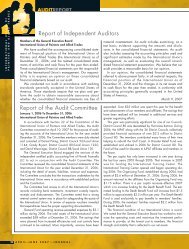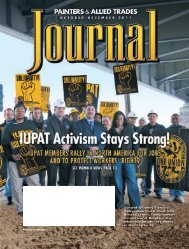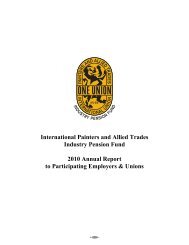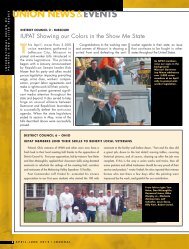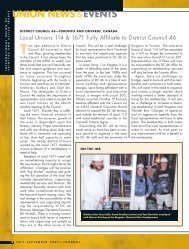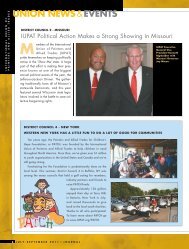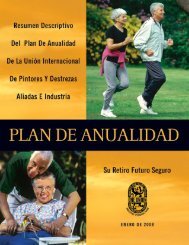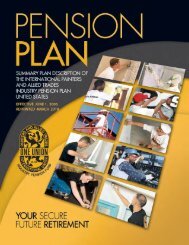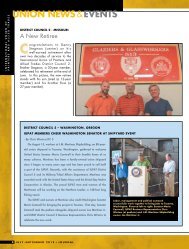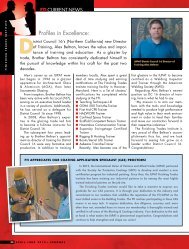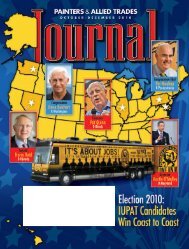Create successful ePaper yourself
Turn your PDF publications into a flip-book with our unique Google optimized e-Paper software.
INTERNATIONAL UNION OFPAINTERS AND ALLIED TRADESGOVERNMENT AFFAIRSContinued from previous pageeffective message about why a candidateis bad for unions when you’retalking to fellow members on how tovote in an election,” says Chris Sloan,director of Government Affairs for theInternational Union of Painters andAllied Trades. “Mr. Romney not onlydid that for us, but he did it on camera.It was like an early Christmaspresent.”In the following months, theseRomney comments and others hemade (most notably his 47 percentspeech he gave at a private fundraiser,also on camera) energized analready hard at work organized labormovement to reelect President Obama.In October, just a few weeks fromElection Day, the AFL-CIO announcedit had registered 450,000 new votersin union households.AFLCIO.org reported that the“newly registered voters include68,000 in Ohio, 57,000 inPennsylvania, 13,500 in Colorado,10,000 in Nevada and 6,700 inVirginia. Now, 75 percent of eligiblevoters in union households are registered,versus about 65 percent in thegeneral population.”The efforts paid off. Ohio,Pennsylvania and Colorado played aprominent role in the Obama/Bidenvictory. As did Nevada, a state inwhich the <strong>IUPAT</strong> dedicated itself toregistering new voters and getting outthe vote. In late October, hundreds of<strong>IUPAT</strong> volunteers joined hundreds ofother union activists in Reno, Nevadain massive neighborhood walks toknock on doors and urge residentsto vote Obama/Biden. The messageand motivation of the <strong>IUPAT</strong> volunteerscame through loud and clear.“We think he’s the only candidatefor working families,” said DougChristopher, business manager/secretary-treasurerof District Council 16representing Northern California andparts of Nevada. “He supports ourissues, he supports what we’re aboutand we need a president to look atthe middle class and working families.This isn’t a union or non-unionissue; it’s about people who have toget up every day and go to work.We need a president who is going todo things that represent our interests inWashington, DC and throughout thiscountry.”“Not so long ago, we wentthrough eight years of having anadministration that didn’t supportworking families, and did everythingthey could to stack the deckagainst working families,” said ToddCoke, regional director in NorthernNevada for DC 16. “We were partof the change four years ago, andwe aren’t done yet. We haven’tfixed everything that’s been wrongwith the country, but we’re well onour way and we don’t want to gobackwards now.”That message seemed to ringloud and clear for the residents ofNevada as 51 percent of the votewent to reelect President Obama. Yet,Nevada wasn’t the only state where<strong>IUPAT</strong> activism was proud and strong.Throughout the United States, overover 40,000 volunteers were organizedto knock on doors, show our colorsat rallies and work phone banks tonot only successfully put our presidentback in office, but local candidates aswell.“Once again the <strong>IUPAT</strong> Army ofBlack and Gold raised the bar for therest of the labor movement in activism,”says <strong>IUPAT</strong> General PresidentJames Williams. “This was absolutelyour best turnout in terms of volunteersand we were at the top of our game incoordinating all the feet on the streetto put our candidates in office. I wantto thank all of our members who putso much time into this successful campaign.”The election may be done, but thework on Capitol Hill in Washington,and on Parliament Hill in Canada, isfar from done. There are plenty of legislativeissues soon to be up for voteby our leaders, and the <strong>IUPAT</strong> willbe there to make certain our voice isheard on each of them.Project Labor Agreements (PLA) are agreements between a contractor*and local building trades union on a project. The agreement sets a standardof pay and benefits for the workers and prohibits work stoppages if there aredisputes between the parties. PLAs have been proven to be extremely efficientand valuable for the bottom line of companies on projects in both the public andprivate sectors, yet detractors object (for mostly political reasons) to the unionelement of them.The Davis-Bacon Act was passed in 1931 and essentially requires thatworkers on public projects be paid the local prevailing wage rate. Its intentis to ensure that companies don’t bring workers into an area who work forsignificantly lower pay than the local workforce.26 October-december 2012 • J ournal



